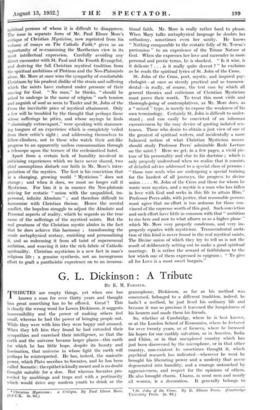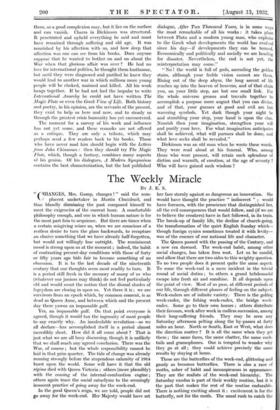G. L. Dickinson : A Tribute
BY E. M. FORSTER.
TRIBUTES are empty things, yet when one has known a man for over thirty years and thought him great something has to be offered. Great*? This is clearly the wrong word for Lowes Dickinson, it suggests inaccessibility and the power of making others feel small, whereas he had the power of bringing people out. While they were with him they were happy and amused. When they left him they found he had extended their sympathies and exercised their intelligence, so that the earth and the universe became larger places—this earth for which he has little hope, despite its beauty and fascination, that universe in whose light the earth will perhaps be reinterpreted. He has, indeed, the maieutic power, which Plato ascribes to Socrates, and he has been called Socratic : the epithet is kindly meant and is no doubt thought suitable for a don. But whereas Socrates pro- ceeded by snubbings and traps and with a pertinacity which would drive any modern youth to drink or the
(S.P.C.K. 3s. 6d.)
gramophone, Dickinson, as far as his method was concerned, belonged to a different tradition, indeed, he hadn't a method, he just lived his ordinary life and because it was so precious it leavened the lumpishness of his hearers and made them his friends.
So, whether at Cambridge, where he is best known, or at the London School of Economics, where he lectured for over twenty years, or at Geneva, where he focussed his hopes for our earthly salvation, or in America, India and China, or in that unexplored country which has just been discovered by the microphone, or in that other country, non-existent he sometimes thought it, which psychical research has indicated—wherever he went he brought his liberating power and a modesty that never degenerated into humility, and a courage untouched by aggressiveness, and respect for the opinions of others. He also brought charm. Charm, in most men and nearly all women, is a decoration. It generally belongs to * Christian Misticiem : a Critique. By Paul Elmer More. t St. John of the Cross. By E. Allison Peers. (Cambridge
University Press. 2s. 6d.)
them, as a good complexion may, but it lies on the surface and can vanish. Charm in Dickinson was structural. It penetrated and upheld everything he said and must have remained through suffering and old age. It was nourished by his affection with us, and how deep that affection was one can see from his books. Does anyone suppose that he wanted to bother on and on about the War when that glorious affair was over ? He had no love for international politics, he thought them loathsome, but until they were diagnosed and purified he knew they would lead to another war in which millions more young people will be choked, maimed and killed. All his work hangs together. If he had not had the impulse to write International Anarchy he could not have written The Magic Flute or even the Greek View of Life. Both history and poetry, in his opinion, are the servants of the present, they exist to help us here and now, and to steady us through the greatest crisis humanity has yet encountered.
The moment for a survey of his work and influence has not yet come, and these remarks are not offered as a critique. They are only a tribute, which may perhaps send a few readers back to his books. Those who have never read him should begin with the Letters from John Chinaman : then they should try The Magic Flute, which, though a fantasy, combines many aspects of his genius. Of his dialogues, A Modern Symposium contains the best characterization, but the last published dialogue, After Two Thousand Years, is in some ways the most remarkable of all his works : it takes place between. Plato and a modern young man, who explains to the Greek what developments the world has evolved since his day—if developments they can be termed. Economically and politically and socially we are heading for disaster. Nevertheless, the end is not yet, the reinterpretation may come."
" No ! the world is full of gods, ascending the golden stairs, although your feeble vision cannot see them. Rising out of the deep abyss, the long ascent of life reaches up into the heaven of heavens, and of that chain you, on your little step, are but one small link. For the whole universe groans and travails together to accomplish a purpose more august that you can divine, and of that, your guesses at good and evil are but wavering symbols. Yet dark though your night be and stumbling your step, your hand is upon the clue. Nourish then your imagination, strengthen your will and purify your love. For what imagination anticipates shall be achieved, what will pursues shall be done, and what love seeks shall be revealed."
Dickinson was an old man when he wrote these words. They were read aloud at his funeral. Who, among those who were present, will retain such splendour of diction and warmth, of emotion, at the age of seventy ? Who will have gained such wisdom ?































 Previous page
Previous page